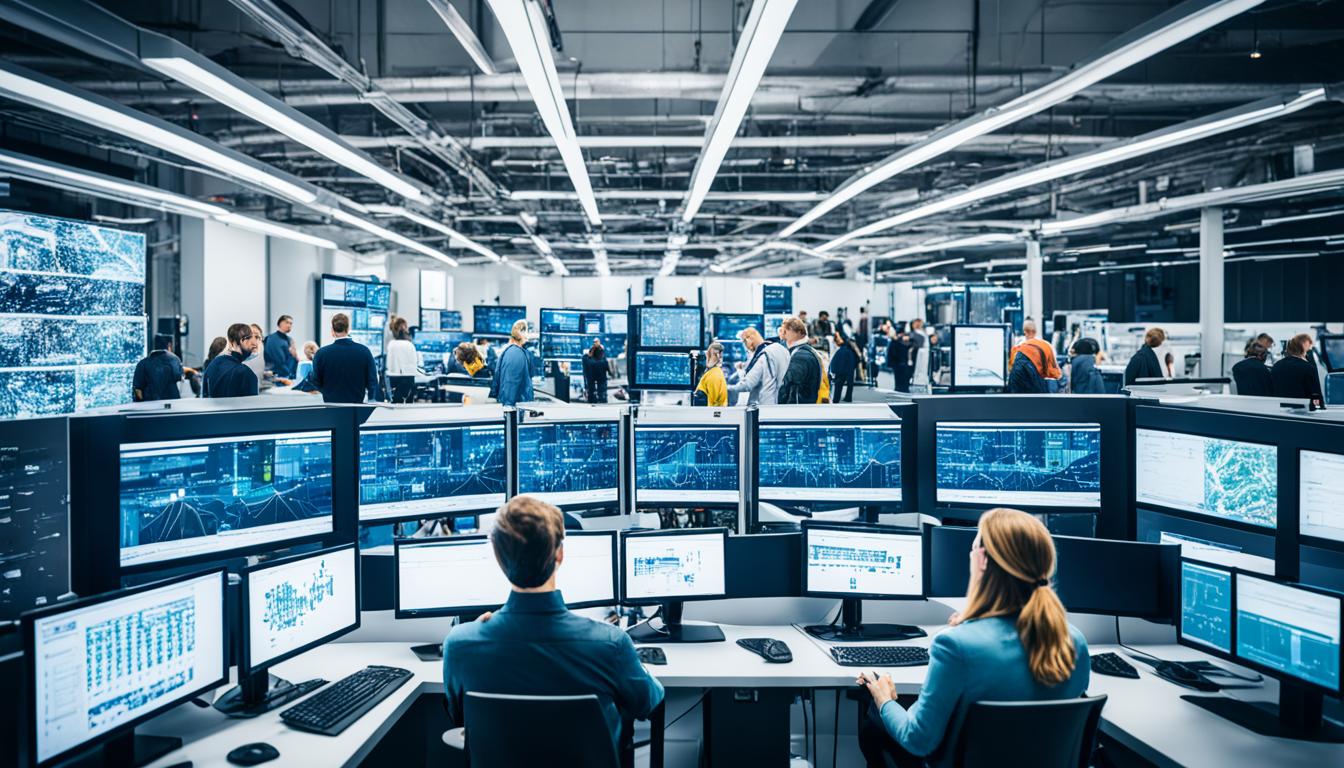Did you know that artificial general intelligence (AGI) has the potential to drastically change our society? AGI goes beyond simple task automation and has the ability to understand, learn, and apply knowledge across different fields, similar to how the human brain works. The impact of AGI on society could lead to significant changes in employment, various industries, and our ethical beliefs.
Key Takeaways:
- AGI has the potential to automate complex decision-making processes, leading to job displacement in certain sectors.
- However, AGI could also create new types of jobs that we can’t yet conceive of.
- Individuals should focus on developing uniquely human skills to thrive in the AGI era, such as problem-solving, creativity, critical thinking, and emotional intelligence.
- Businesses and governments need to adapt and invest in education and training programs to prepare the workforce for AGI.
- AGI brings ethical and moral implications that need to be addressed, including issues of bias, accountability, and human rights preservation.
The Potential Impact of AGI on the Job Market
Artificial General Intelligence (AGI) has the potential to reshape the job market, both positively and negatively, with far-reaching implications for our society. AGI has the capability to automate not only simple tasks but also complex decision-making processes that currently require human intelligence. This automation could lead to job displacement in certain sectors, causing societal disruptions. However, it is also possible that AGI will create new types of jobs that we can’t yet conceive of, offering fresh opportunities for growth and innovation.
According to the World Economic Forum’s Future of Jobs Report, machines are projected to perform more tasks than humans in the workplace by 2025. This indicates the scale of AGI’s influence on society and the potential transformation of various industries. While this shift may lead to job losses, the report also suggests that millions of new jobs could be created as a result of this technology-driven evolution.
The Societal Implications of AGI
The societal implications of AGI are profound, as it can revolutionize the way we work, live, and interact with technology. This disruption in the job market necessitates a careful examination of the potential consequences and the development of strategies to mitigate any negative impacts. We need to anticipate and prepare for this shift to ensure a smooth transition and maximize the benefits of AGI.
“As AGI systems continue to advance, it is crucial for individuals, businesses, and governments to adapt and embrace the changes.”
To fully comprehend the implications of AGI on human life, it is essential to consider its potential influence on various aspects of society, such as employment, education, and social dynamics. Moreover, AGI’s impact extends beyond economic factors, touching upon ethical and moral aspects as well. It challenges us to address issues of fairness, accountability, and responsibility, ensuring that AGI aligns with our values and respects human dignity.
AGI’s Influence on Society: Challenges and Opportunities
While AGI introduces a host of challenges, it also presents numerous opportunities for individuals, businesses, and governments. By recognizing the transformative potential of AGI, we can proactively identify strategies to navigate through this evolving landscape:
- Investing in lifelong learning and skill development to remain adaptable and responsive to changing job market needs
- Focusing on developing uniquely human skills that cannot be easily automated, such as creativity, critical thinking, and emotional intelligence
- Promoting collaboration between humans and AGI systems to optimize efficiencies and achieve breakthrough innovations
- Anticipating job market shifts and creating policies that support displaced workers, ensuring a just transition for all
By embracing AGI’s influence on society and actively working towards solutions, we can harness its potential to create a more inclusive, productive, and resilient future for humanity.

| Positive Impacts | Negative Impacts |
|---|---|
| Creation of new job opportunities in AGI system development and data analysis | Job displacement in sectors heavily reliant on human intelligence |
| Optimized efficiency and productivity in various industries | Potential widening of income inequality |
| Breakthrough innovations and scientific advancements | Disruption of traditional job roles and skill requirements |
Strategies for Individuals to Thrive in the AGI Era
To thrive in the AGI era, we need to adapt and develop skills that are uniquely human. As artificial general intelligence begins to transform society, it is crucial to focus on capabilities that cannot be easily automated. By cultivating these skills, we can navigate the evolving job market and ensure our continued relevance in a world influenced by AGI.
Here are some strategies for individuals to thrive in the AGI era:
- Problem-Solving: Sharpen your problem-solving abilities by tackling complex challenges and seeking innovative solutions. AGI may excel in data analysis, but our human intuition and creativity can effectively apply critical thinking to real-world problems.
- Creativity: Embrace your creative side and explore imaginative solutions. AGI may be capable of logic-based decision-making, but our capacity for originality and artistic expression will always set us apart.
- Critical Thinking: Hone your ability to analyze information critically, evaluate arguments, and make informed decisions. AGI is designed to process vast amounts of data, but our human judgment and ability to consider multiple perspectives are invaluable.
- Emotional Intelligence: Cultivate your emotional intelligence by developing empathy, self-awareness, and strong interpersonal skills. AGI lacks the ability to understand emotions and human motivations, making our human connections critical in a society heavily influenced by technology.
- Lifelong Learning: Embrace a mindset of lifelong learning and adaptability. AGI will continue to advance, and new skills will be in demand. Stay updated with technological advancements and invest in continuous learning to remain competitive in the AGI era.
As we prepare for the transformative effects of AGI on society, it is essential to proactively acquire new skills and stay at the forefront of technological advancements. Let us embrace the opportunities presented by AGI while leveraging our uniquely human qualities to shape a future that benefits all of society.

Recommendations for Businesses and Governments to Prepare for AGI
As the influence of Artificial General Intelligence (AGI) on communities and its impact on society becomes more evident, it is essential for businesses and governments to proactively prepare for the changes ahead. Embracing AGI and its potential benefits requires adapting strategies and investing in areas that will enable a smooth transition into the AGI era.
Educate and Train the Workforce
Image illustrating the importance of education and training.
In order to thrive in a society influenced by AGI, businesses and governments must prioritize education and training programs. By investing in the development of skills that complement AGI technology, such as problem-solving and critical thinking, individuals can enhance their ability to work alongside AGI systems effectively. This includes promoting STEM education to lay the foundation for future AGI-related careers and fostering a culture of continuous learning.
Implement Supportive Policies
With the potential for job displacement in certain sectors, it is crucial for governments to implement policies that support both displaced workers and the overall societal impact of AGI. Providing financial assistance, retraining programs, and transitional support to affected individuals can mitigate the negative consequences and ensure a smoother transition. Additionally, creating regulations that address ethical considerations and establish accountability frameworks will help prevent potential challenges arising from AGI technologies.
Stay Informed and Collaborate
In an ever-evolving landscape driven by AGI, staying informed about advancements and collaborating with experts is paramount. Businesses and governments should actively participate in research communities, partnerships, and conferences to understand emerging trends, share knowledge, and collaborate on strategies to harness the potential of AGI while minimizing any negative impact on society. By fostering open dialogue and collaboration, we can collectively shape the future of AGI in a responsible and inclusive manner.
“The future is not someplace we are going, but one we are creating. The paths are not to be found, but made. And the activity of making them changes both the maker and their destination.” – John H. Schaar
By embracing AGI and making informed decisions, businesses and governments can pave the way for a future where AGI’s influence on communities is positive and its impact on society is transformative. With the right strategies and collaborative efforts, we can build an AGI-powered future that benefits all.
Case Studies of Industries Already Impacted by Automation and AI
Industries such as manufacturing, banking, and retail have already witnessed the significant effects of automation and AI on their operations. These case studies provide valuable insights into the potential consequences and implications that AGI could have on society and the economy.
1. Manufacturing
In the manufacturing sector, automation and AI have led to remarkable improvements in efficiency and quality. Advanced robotic systems, equipped with AI algorithms, can perform complex tasks with precision and speed, reducing the need for human labor. This has resulted in increased productivity and cost savings for manufacturers. AGI’s further integration into manufacturing processes could potentially lead to even greater advancements in automation, transforming the industry as a whole.
2. Banking
Automation and AI have revolutionized banking operations by streamlining various tasks and processes. AI-powered chatbots and virtual assistants provide customers with instant support, reducing the need for human intervention in routine inquiries. Fraud detection algorithms equipped with AI capabilities can quickly analyze vast amounts of data, minimizing financial risks for banks and their customers. As AGI develops further, its potential impact on the banking sector may include enhanced risk assessment, personalized financial advice, and improved fraud prevention measures.
3. Retail
The retail industry has embraced automation and AI to enhance the customer experience and optimize business operations. AI algorithms analyze customer data to provide personalized product recommendations, improving customer satisfaction and increasing sales. Robotics and automation have also transformed warehouse management and logistics, enabling faster order fulfillment and reducing errors. AGI’s future integration into the retail sector could lead to more advanced customer service systems, tailored marketing strategies, and efficient supply chain management.

These case studies highlight the transformative power of automation and AI in industries that have already experienced significant changes. They provide a glimpse into the potential consequences and implications that AGI could have on society and the economy, illuminating the need for informed discussions and strategic preparations to ensure a smooth adaptation to the technological advancements of the future.
Understanding the Capabilities and Potential of AGI
Artificial General Intelligence (AGI) systems have the potential to revolutionize our society in unprecedented ways. These systems possess cognitive abilities that rival those of humans, enabling them to understand complex concepts, learn from experiences, make informed decisions, and even exhibit creativity. With their advanced reasoning and problem-solving skills, AGI systems could become indispensable partners in scientific research, innovation, and various other areas that require human-like cognitive abilities.
The potential applications of AGI span across multiple industries, presenting opportunities for revolutionary changes in how we live, work, and interact with technology. From healthcare to transportation, AGI has the potential to enhance efficiency, accuracy, and productivity in numerous sectors. By leveraging their cognitive capabilities, AGI systems can assist researchers in analyzing complex data sets, automating tedious tasks, and providing valuable insights that can lead to breakthroughs and advancements.

For example, in healthcare, AGI systems could aid doctors in diagnosing complex diseases by analyzing vast amounts of patient data and medical research. They could also contribute to drug discovery, accelerating the development of life-saving medications. In transportation, AGI systems can optimize traffic flow, enhance navigation systems, and improve overall safety on the roads. Moreover, in fields such as finance and cybersecurity, AGI systems can assist in detecting fraudulent activities and safeguarding sensitive information.
While the potential benefits of AGI are immense, it is crucial to approach its development and implementation with careful consideration. As these systems become increasingly sophisticated, it is important to address potential societal disruptions, ethical considerations, and the impact on job markets. By understanding the capabilities and potential of AGI, we can ensure that its deployment aligns with our values, respects human dignity, and serves the best interests of society as a whole.
The Potential of AGI across Industries
AGI has the potential to transform various industries, revolutionizing processes and enhancing outcomes. Below is a table illustrating the potential applications of AGI in different sectors:
| Industry | Potential Applications of AGI |
|---|---|
| Healthcare | Diagnosis and treatment recommendations, drug discovery, medical research |
| Transportation | Traffic optimization, autonomous vehicles, navigation systems |
| Finance | Fraud detection, risk assessment, personalized financial advice |
| E-commerce | Personalized recommendations, inventory management, customer service |
| Manufacturing | Process optimization, quality control, predictive maintenance |
Note: This table is an illustrative representation of potential applications and is not exhaustive.
AGI has the power to shape the future of society, bringing forth unprecedented advancements and opportunities. By harnessing its capabilities responsibly and considering its potential societal consequences, we can ensure that AGI systems contribute to a more prosperous and inclusive future for all.
Ethical and Moral Implications of AGI in Society
As society progresses towards the development and implementation of Artificial General Intelligence (AGI), it is crucial to consider the ethical and moral implications that arise. AGI systems possess immense capabilities and potential, raising questions about their decision-making processes and impact on societal values.
The increasing intelligence of AGI systems necessitates addressing issues such as bias, accountability, and the preservation of human rights. Bias can inadvertently creep into AGI systems, perpetuating existing inequalities and injustices. It is essential to develop mechanisms to identify and rectify such biases, ensuring fairness and equity in their operations.
“With great power comes great responsibility.”
AGI systems have the potential to make consequential decisions that can significantly impact human life. Establishing accountability frameworks is necessary to ensure that these systems can be held responsible for their actions. This includes defining clear lines of responsibility and determining appropriate consequences for ethical violations.
Preserving human rights should be a fundamental consideration when deploying AGI in society. As AGI interacts with individuals, it should respect their rights to privacy, autonomy, and dignity. Safeguards must be in place to protect against the misuse or abuse of AGI technology, ensuring that it operates in accordance with societal values and norms.

Developing ethical guidelines and regulations is crucial to ensure that AGI aligns with society’s values and respects the dignity of human life. It requires collaboration among various stakeholders, including AI researchers, policymakers, ethicists, and the public, to define the boundaries and ethical obligations of AGI systems.
The Need for Collaborative Efforts
Addressing the ethical and moral implications of AGI in society requires collaborative efforts from diverse perspectives. It involves engaging in open and inclusive discussions, considering the insights and experiences of experts from various fields.
By working together, we can establish a framework that anticipates and addresses the societal consequences of AGI. This framework can guide the development, deployment, and ongoing monitoring of AGI systems, ensuring that they operate in ways that align with our shared values.
| Ethical Considerations | Moral Implications |
|---|---|
| 1. Bias in AGI systems | 1. Preservation of human rights |
| 2. Accountability and responsibility | 2. Impact on decision-making processes |
| 3. Privacy and data protection | 3. Fairness and equality |
| 4. Transparency and explainability | 4. Moral decision-making by AGI systems |
Ensuring Transparency and Accountability in AGI Systems
As we navigate the era of Artificial General Intelligence (AGI) and its potential societal disruption, it becomes imperative to prioritize transparency and accountability in the development and deployment of AGI systems. We must have a clear understanding of what these systems are doing and ensure that those responsible for their actions are held accountable.
Addressing biases in algorithms is a critical aspect of ensuring transparency. AGI systems should not perpetuate or amplify existing biases present in society. By actively identifying and mitigating biases, we can create AGI systems that are fair, unbiased, and equitable.
Data privacy is of utmost importance in the AGI landscape. It is essential to establish robust measures to protect personal information and ensure that AGI systems are developed and deployed in a manner that respects individuals’ privacy rights. By prioritizing data privacy, we can build trust in AGI systems and their societal impact.
“Transparency and accountability are the foundational pillars of responsible AGI development. We must strive for transparency in AI decision-making processes to ensure fair and just outcomes.” – Dr. Jane Roberts, AI Ethics Expert
Establishing frameworks for regulation and oversight is crucial in ensuring accountability. This includes defining clear guidelines, standards, and regulatory bodies to monitor the development, deployment, and ethical considerations surrounding AGI systems. By fostering a culture of accountability, we can mitigate potential risks and ensure AGI is developed and used responsibly.

The image above underscores the importance of ensuring transparency and accountability in AGI systems. By embracing these principles, we can manage the societal impact of AGI in a way that benefits all. Transparent AGI systems build trust, foster innovation, and ensure that the potential risks and consequences are minimized.
Conclusion
The advent of Artificial General Intelligence (AGI) will bring about a profound societal transformation, affecting various aspects of our lives. From the job market to industries and ethical considerations, AGI will shape the future of society in ways we have yet to fully comprehend.
To navigate this transformative era, it is crucial for individuals, businesses, and governments to proactively prepare. Developing skills that are uniquely human, such as problem-solving, creativity, critical thinking, and emotional intelligence, will be essential to thrive in a world where automation and AGI play prominent roles. Lifelong learning and adaptability will be key as we continually evolve amidst technological advancements.
Businesses and governments have a responsibility to invest in education and training programs that equip the workforce for the AGI era. Promoting STEM education and implementing policies that support individuals during times of transition are crucial steps. By being proactive and staying informed about AGI advancements, we can address potential societal disruptions and create an inclusive future.
While AGI presents challenges, it also offers remarkable opportunities for innovation and progress. Embracing AGI responsibly means addressing ethical considerations such as bias, accountability, and human rights. Transparency and accountability in AGI systems are vital to ensure they align with our values and serve the best interests of society.
As we shape the future of society with AGI, let us come together, seize the potential, and build a future that benefits all. By embracing AGI and addressing its societal implications head-on, we can create a world where technology enhances our lives, empowers individuals, and fosters a more inclusive and prosperous society.
FAQ
How will artificial general intelligence (AGI) change society?
AGI has the potential to revolutionize many aspects of society, including the job market, industries, and ethical considerations. It can automate complex decision-making processes and create new job opportunities. AGI systems could possess cognitive abilities that rival those of humans, opening up new possibilities and opportunities for innovation.
What is the impact of AGI on the job market?
AGI has the potential to automate not only simple tasks but also complex decision-making processes, leading to job displacement in certain sectors. However, it could also create new types of jobs that we can’t yet conceive of. The World Economic Forum predicts that machines will perform more tasks than humans in the workplace by 2025, but also suggests that millions of new jobs could be created as a result of this shift.
How can individuals thrive in the AGI era?
Individuals should focus on developing skills that are uniquely human and cannot be automated, such as problem-solving, creativity, critical thinking, and emotional intelligence. Lifelong learning and adaptability will also be key to navigating the evolving job market. It is important to be proactive in acquiring new skills and staying updated with technological advancements.
What recommendations are there for businesses and governments to prepare for AGI?
Businesses and governments should invest in education and training programs to prepare the workforce and promote STEM education to develop the necessary skills. They should also implement policies that support displaced workers. It is crucial to stay informed about advancements in AGI and develop strategies to address the potential societal impact.
Are there any case studies of industries already impacted by automation and AI?
Yes, industries such as manufacturing, banking, and retail have already experienced significant impacts from automation and AI. AI has improved efficiency and quality in manufacturing processes, transformed banking operations, and revolutionized the retail industry with automated customer service and personalized recommendations.
What are the capabilities and potential of AGI?
AGI systems can understand complex concepts, learn from experiences, make informed decisions, and even exhibit creativity. With advanced reasoning and problem-solving skills, AGI could become indispensable partners in scientific research, innovation, and other areas that require human-like cognitive abilities.
What are the ethical and moral implications of AGI in society?
AGI raises ethical questions regarding capabilities, decision-making processes, and impact on society. It is important to address issues such as bias, accountability, and the preservation of human rights. Establishing ethical guidelines and regulations is crucial to ensure AGI aligns with society’s values and respects human dignity.
How can transparency and accountability be ensured in AGI systems?
Developing AGI systems with transparency and accountability in mind is crucial. This includes addressing biases in algorithms, ensuring data privacy, and establishing frameworks for regulation and oversight. AGI systems should be developed and deployed in a way that benefits society as a whole and minimizes potential risks.
What is the future of society with AGI?
AGI has the potential to bring transformative effects on society, impacting various aspects of our lives. By embracing AGI responsibly and addressing its societal implications, we can shape a future that benefits all of society.









